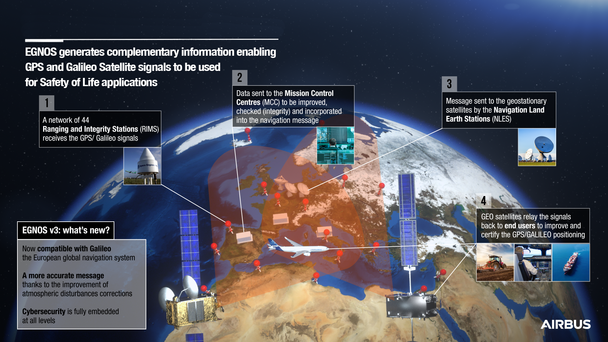EGNOS V3 to support safety-critical aircraft, maritime and land applications
EGNOS V3 System CDR passed on schedule on 7 Dec 2022
Airbus has successfully achieved the System Critical Design Review (CDR) on the EGNOS V3 satellite-based augmentation system. The EGNOS V3 (European Geostationary Navigation Overlay Service) is designed to add key security features for the most safety-critical applications such as aircraft navigation and landing, and will provide entirely new services for maritime and land users. EGNOS V3 is the second generation of the overlay system and will improve the performance of GPS and Galileo.
The new V3 generation of EGNOS being developed by Airbus will introduce new services based on multiple frequencies of multiple constellations (GPS, Galileo), and will embed sophisticated security protection against cyber-attacks. The System CDR covers the functional design, external interfaces, operations, security, integration verification, qualification and deployment.
François Gaullier, Head of Telecommunications & Navigation Systems at Airbus said: “EGNOS is a key service across Europe that many people have never heard of, but it is essential for so many applications from air traffic control to maritime operations, and Airbus is committed to further developing the service. Achieving this key milestone on target by the end of the year brings improvements in the performance of navigation satellite systems for safety-critical applications one step closer.”
Javier Benedicto, Director of Navigation at ESA comments: “The successful review confirms that the multi-constellation, multi-frequency EGNOS V3 will be a significant push forward in satellite augmentation. The coming EGNOS V3 will mark a significant step forward enlarging EGNOS accuracy, robustness and overall coverage, thanks to its use of multiple frequencies from both GPS and Galileo.”
EGNOS Exploitation Programme Manager in the European Union Agency for the Space Program (EUSPA) Jean-Marc PIEPLU pointed out that “The increased robustness of EGNOS V3 will allow Europe to further develop its resilience and European actors to continue to develop multi-modal applications. It is with the focus on users’ safety and security that the EUSPA continues to work on EGNOS development together with the institutional and industrial partners.”
EGNOS V3 relies on three operations centres and 44 monitoring stations across Europe and further afield. It monitors the signals from satellite navigation systems and generates augmentation messages, broadcast to all users using transponders on geostationary satellites. In early 2018 Airbus was awarded the prime contract for the EGNOS V3 Implementation Phase by ESA on behalf of the European Union Agency for the Space Programme (previously GSA).
EGNOS is a component of the European Union Space Programme and is managed in the frame of the partnership agreement established between the European Commission’s Directorate-General for Defence, Industry and Space (DG-DEFIS), the European Union Agency for the Space Programme (EUSPA) and the European Space Agency (ESA).
 Airbus is currently building the next generation of Galileo satellites which will improve the accuracy of the system as well as the robustness and resilience of its signal, which will be key for the upcoming digital decade. They will provide new capabilities relying on highly innovative technologies such as digitally configurable antennas, inter-satellite links, new atomic clock technologies and fully electric propulsion systems. The new spacecraft will also be more flexible and reconfigurable in orbit to satisfy the expected evolution in end-user needs.
Airbus is currently building the next generation of Galileo satellites which will improve the accuracy of the system as well as the robustness and resilience of its signal, which will be key for the upcoming digital decade. They will provide new capabilities relying on highly innovative technologies such as digitally configurable antennas, inter-satellite links, new atomic clock technologies and fully electric propulsion systems. The new spacecraft will also be more flexible and reconfigurable in orbit to satisfy the expected evolution in end-user needs.
